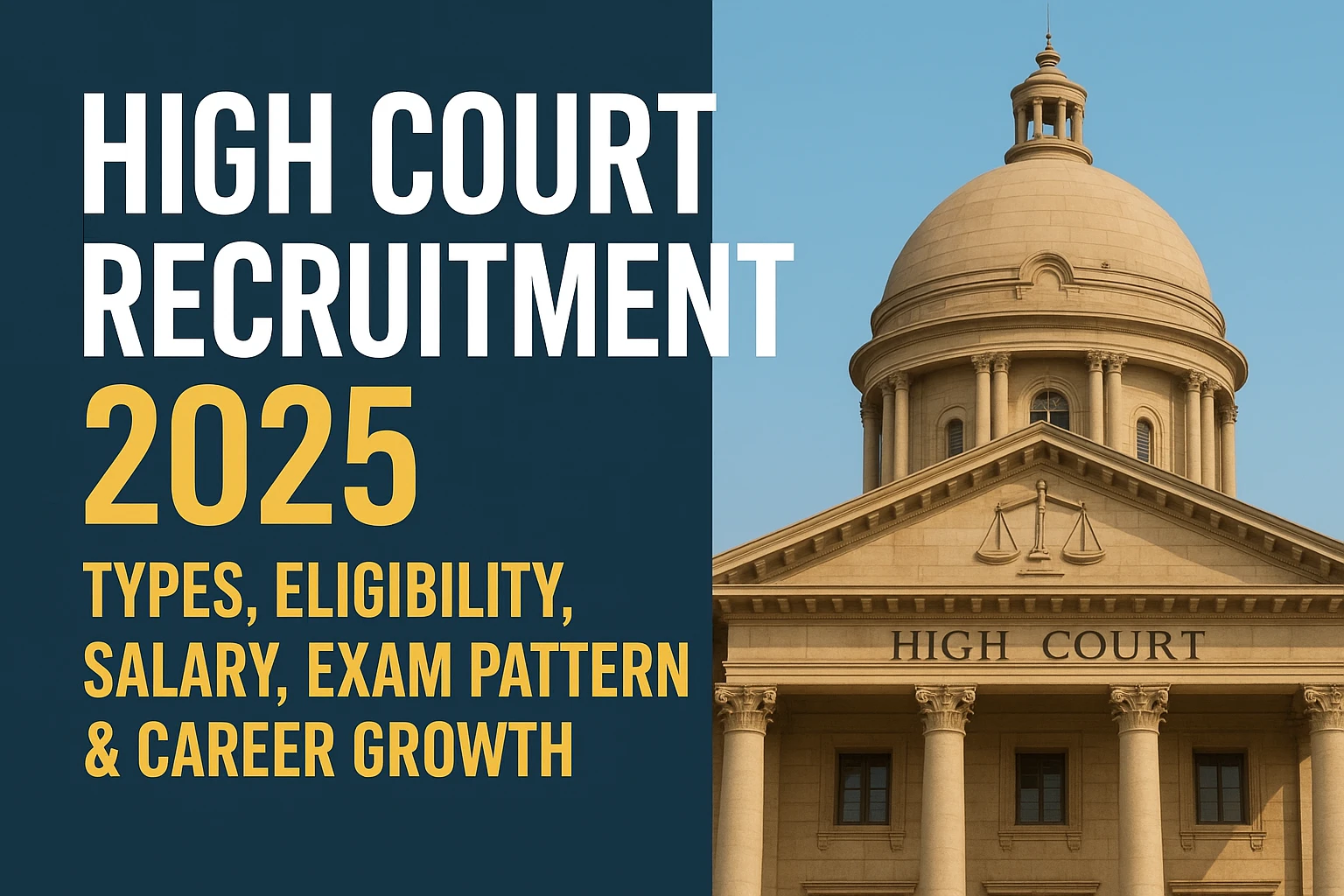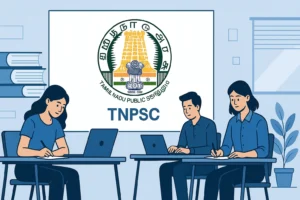Recruitment to the High Courts of India plays a vital role in ensuring smooth judicial functioning. Every year, thousands of aspirants look forward to High Court Recruitment notifications across various states. These recruitments offer stable government jobs with attractive salaries, job security, and opportunities to serve the judicial system. From clerical staff to judges, the High Court employs people across multiple categories.
In this article, we will provide a detailed guide on the different types of High Court Recruitment, covering eligibility, selection process, exam pattern, salary structure, and career growth opportunities.
Introduction to High Court Recruitment
High Courts function as the supreme judicial bodies within each state of India. They are responsible for upholding law and order, delivering justice, and supervising subordinate courts. To carry out these responsibilities, the High Courts require a well-organized staff that includes judges, clerks, stenographers, assistants, researchers, and administrative officers.
High Court Recruitment is usually conducted through written examinations, skill tests, and interviews. Each state’s High Court publishes official notifications with detailed eligibility criteria, syllabus, and examination dates.
Some of the prominent High Courts where recruitment notifications are released frequently include:
- Delhi High Court
- Madras High Court
- Bombay High Court
- Calcutta High Court
- Allahabad High Court
- Karnataka High Court
- Gujarat High Court
- Punjab & Haryana High Court
Types of High Court Recruitment
High Court recruitment covers a wide range of posts.They may be divided into the following main categories:
- Judicial Officers (Judges and Magistrates)
- Clerical and Administrative Staff
- Research and Legal Assistants
- Technical Staff
- Support Staff
Let’s explore each type in detail.
1. High Court Recruitment for Judicial Officers
Judicial officer posts are the most prestigious category in High Court recruitment. Judges play a critical role in interpreting laws and delivering justice.
Posts under Judicial Officer Recruitment:
- Civil Judge (Junior Division)
- District Judge
- Additional District Judge
- Magistrates
Eligibility Criteria:
- Must hold a degree in Law (LLB) from a recognized university.
- Enrolled as an advocate under the Advocates Act, 1961.
- Minimum age: 21 years (varies by state).
- Maximum age: 35–45 years (relaxations for reserved categories).
Selection Process:
- Preliminary Examination (Objective type)
- Mains Examination (Descriptive type)
- Viva Voce / Interview
Salary Structure:
- Civil Judges: ₹27,700 – ₹44,770 per month (varies by state).
- District Judges: ₹51,550 – ₹63,070 per month plus allowances.
Career Growth:
Judicial officers can be promoted from Civil Judge to District Judge and eventually to High Court Judge, depending on merit and seniority.
2. High Court Recruitment for Clerical and Administrative Staff
This is one of the largest segments of High Court Recruitment, offering opportunities for graduates and even candidates with 12th pass qualifications.
Common Posts in this category:
- Judicial Clerk
- Junior Assistant
- Senior Assistant
- Section Officer
- Registrar
- Stenographer
- Personal Assistant
Eligibility Criteria:
- Educational qualification: 12th pass to graduate, depending on the post.
- Typing and shorthand skills required for stenographer and PA posts.
- Age limit: 18–35 years (varies by notification).
Selection Process:
- Written Examination (General Knowledge, English, Computer Knowledge).
- Typing Test / Shorthand Test (for stenographers).
- Interview / Document Verification.
Salary Structure:
- Clerks and Assistants: ₹19,000 – ₹35,000 per month.
- Registrars and Section Officers: ₹35,000 – ₹60,000 per month.
Career Growth:
Clerical staff can rise to higher administrative positions like Section Officer, Deputy Registrar, and Registrar General.
3. High Court Recruitment for Research and Legal Assistants
High Courts frequently hire law graduates as Research Assistants or Law Clerks to assist judges with case studies, legal research, and drafting.
Key Features:
- Contractual positions, usually for 1–2 years.
- Exposure to real-time court proceedings.
- Excellent opportunity for young law graduates preparing for judicial services or higher studies.
Eligibility Criteria:
- Must be a law graduate (freshers are often preferred).
- Age limit: up to 30 years.
- Good knowledge of legal research tools and drafting.
Selection Process:
- Screening test (if applications are high).
- Interview with a panel of judges.
Salary:
- ₹25,000 – ₹40,000 per month (stipend basis).
Career Growth:
Though temporary, these roles serve as a stepping stone toward becoming a judge, advocate, or researcher.
4. High Court Recruitment for Technical Staff
With the increasing use of technology in court proceedings, High Courts also recruit technical staff.
Posts include:
- IT Officer
- System Analyst
- Computer Operator
- Network Engineer
- Technical Assistant
Eligibility Criteria:
- B.Tech / MCA / Diploma in Computer Science or IT.
- Relevant work experience in software and networking.
- Age limit: 21–35 years.
Selection Process:
- Written examination (IT-related topics).
- Practical test on computer systems.
- Interview.
Salary:
- Technical staff salaries range from ₹25,000 to ₹60,000 depending on the role.
Career Growth:
Technical professionals may be promoted to higher IT management roles in the judiciary system.
Read Also: TNPSC Group 2 Hall Ticket Download
5. High Court Recruitment for Support Staff
Support staff are essential for the day-to-day functioning of the court.
Posts include:
- Drivers
- Peons / Office Attendants
- Court Officers
- Process Servers
- Sweepers
Eligibility:
- Minimum qualification: 8th/10th/12th pass depending on the post.
- Valid driving license required for driver posts.
- Age limit: 18–35 years.
Selection Process:
- Written / Practical Test.
- Skill Test (if applicable).
- Document Verification.
Salary:
- ₹15,000 – ₹25,000 per month plus benefits.
Eligibility and Age Relaxation
High Court recruitments usually provide age relaxation for reserved categories as per government rules. Common relaxations include:
- SC/ST: 5 years
- OBC: 3 years
- Persons with Disabilities (PwD): 10 years
- Ex-servicemen: As per rules
Examination Pattern
While exam patterns vary from state to state, most High Court recruitment tests follow a similar structure:
- Preliminary Test: Objective-type questions on General Knowledge, English, Law (for judicial posts), Computer Knowledge.
- Mains Examination: Descriptive papers focusing on essay writing, legal drafting, case studies.
- Skill Test: Typing test, shorthand test, or computer test depending on the post.
- Interview: Personal interview to assess communication, confidence, and knowledge.
Salary and Perks
The High Court offers competitive salaries with additional benefits such as:
- Dearness Allowance (DA)
- House Rent Allowance (HRA)
- Travel Allowance (TA)
- Medical Benefits
- Pension (for permanent posts)
Benefits of High Court Recruitment
- Job Security: Government jobs with strong legal backing.
- Good Salary and Allowances: Attractive pay scales compared to many state jobs.
- Career Growth: Opportunities for promotions and higher designations.
- Prestige: Working in the judiciary brings social respect.
- Work-Life Balance: Fixed working hours and regular holidays.
How to Prepare for High Court Recruitment Exams
- Understand the Syllabus and Exam Pattern.
- Read NCERT books for General Knowledge.
- Practice previous years’ papers.
- Focus on English, Computer Knowledge, and Aptitude.
- Improve typing speed (for clerical and stenographer posts).
- Stay updated with current affairs.
Latest Updates
- Many High Courts are moving toward online recruitment systems with computer-based tests.
- E-courts project has increased demand for IT professionals.
- Contractual research assistants are being hired regularly for young law graduates.
Conclusion
High Courts play a central role in India’s judicial framework, and High Court Recruitment provides aspirants with a golden opportunity to secure a prestigious government job. Whether you are a law graduate aspiring to become a judge, a young professional aiming for clerical posts, or an IT specialist seeking technical roles, the High Court offers diverse career paths.
With proper preparation and dedication, candidates can successfully clear the exams and interviews to build a stable and respected career in the judiciary system.




Pingback: Best Profitable Niche in 2025 for Blogging Success - EduCareerGuides